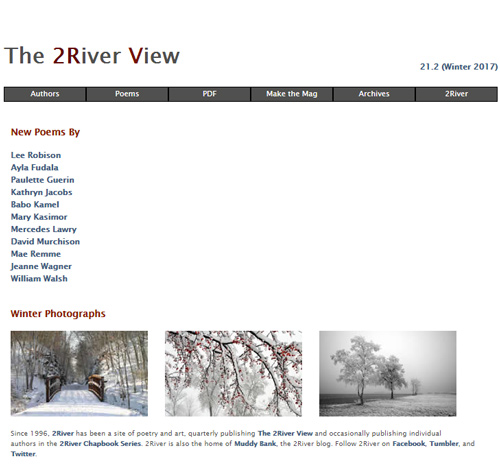The 2River View – Winter 2017
There’s something unassuming about The 2River View. They reject the flashy for a simple, quiet website. This doesn’t work against them, though. Instead, the simplicity is welcoming and calming, the homepage pointing readers in the direction of whatever they seek: an issue archive, information about their “2River Favorite Poem Project,” and, of course, the current issue. The current Winter 2017 issue is paired with three images of winter, the scenes whited-out with snow. Many of the pieces found in this issue coincidentally left me with the chills, fitting choices for inclusion in a winter issue. In addition, each poet provides a voice recording of their poetry, resulting in a complete, cohesive collection as it intimately connects reader to writer.
There’s something unassuming about The 2River View. They reject the flashy for a simple, quiet website. This doesn’t work against them, though. Instead, the simplicity is welcoming and calming, the homepage pointing readers in the direction of whatever they seek: an issue archive, information about their “2River Favorite Poem Project,” and, of course, the current issue. The current Winter 2017 issue is paired with three images of winter, the scenes whited-out with snow. Many of the pieces found in this issue coincidentally left me with the chills, fitting choices for inclusion in a winter issue. In addition, each poet provides a voice recording of their poetry, resulting in a complete, cohesive collection as it intimately connects reader to writer.
Mae Remme utilizes her voice recording effectively, one of those pieces that gave me the chills. She performs her poems with soft-spoken intensity. In “The Brighter the Light, the Darker,” her voice builds up to hiss out the ending, “Burn it all. I’ll keep coming back,” the line and aural effect producing shivers. While already a strong ending to the poem, hearing it in the writer’s own words and voice adds another dimension.
Similarly, Ayla Fudala raises goose bumps with “Invocation” and “The Stranger.” In “Invocation,” her images are brutal and raw: “My lips shred / Into petals” and “My cheeks are filled with your teeth,” yet Fudala’s voice is calm and pleasant enough, peace among carnage. In “The Stranger,” the speaker’s mother has passed away and “now her house is filled with mice.” The mice are “Lining the breezeway with gray” and are “Crushed beneath my naked feet,” lending a dark, haunted feel to the piece. Again, Fudala reads in the same even tone, unflinching in the face of the macabre images she creates.
Lee Robinson and his voice recording reinforce mood. “Rue Day” is a quiet poem with a more somber tone, muted in shades of gray, a poem of “empty trees and sunlessness.” His voice lulls listeners, transporting us into a dreary winter afternoon. But the day and the poem is brightened with the flash of red from the crown of a woodpecker.
David Murchison offers a different experience, reading poems that are from the point of view of a woman. In “Mama Is Coming Home,” a woman sits outside with her lover as he smokes a joint and she studies the trees that were burned down from a wildfire a year ago. The New Age speaker of “What He Doesn’t Know” speaks about her religious husband, the similarities and differences of their respective spiritual rituals: a crystal ball versus prayers, tarot card readings versus midnight Christmas mass. I enjoyed both poems, the storytelling in “Mama Is Coming Home,” and the exploration of faith in “What He Doesn’t Know,” and had I only read them, I probably would’ve assumed they were written by a woman, a testament to Murchison’s expertise in voice.
In her poems “Bathsheba” and “3:22 a.m.” Paulette Guerin also brings up religion. “Bathsheba” gives the point of view of the Biblical woman who has an affair with David after he sees her bathing in her garden. Guerin brings us to the garden to be with Bathsheba as she partakes in “one ritual / for which she needed no prayer, / lowering herself into reflected sky.” While Bathsheba is often painted as a sinner, a temptress, Guerin reminds us she’s just a woman taking a bath, and David is alluded to as the one at fault: “cedars / darkening the hillside.” Both Guerin’s poems deal with religion, a topic that’s been written about often, but she gives a unique perspective and fresh take in both.
Readers may not be met with the snazziest, flashiest website around when visiting The 2River View, but they will find beautiful poems by a talented bunch of writers. I urge readers to take advantage of the recordings in this issue. Hit play, close your eyes, lean back, and let someone read you poetry—you deserve it.
[www.2river.org]






